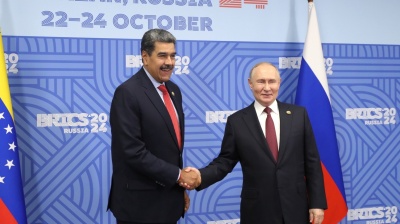Serbian Deputy Prime Minister Aleksandar Vulin met with Russian President Vladimir Putin at the Eastern Economic Forum in Vladivostok on September 4, where he underscored Serbia's unwavering alliance with Russia and reiterated the country's refusal to impose sanctions on Moscow or join Nato.
Serbia continues to pursue a dual-track foreign policy, seeking closer ties with the EU while maintaining its deep-rooted relationship with Russia. Just two days before Vulin’s meeting with Putin, Prime Minister Milos Vucevic was in Bled, Slovenia, affirming that EU membership remains "the main political goal of Serbia". Despite this, Vulin’s meeting in Vladivostok was marked by strong pro-Russian rhetoric.
"Serbia is not only a strategic partner of Russia, Serbia is also Russia’s ally," Vulin told Putin during their discussion. Vulin, who has been sanctioned by the United States for alleged involvement in illegal arms shipments, drug trafficking and aiding Russian influence in the Balkans, expressed his appreciation for Russia’s support of Serbia's territorial integrity and its refusal to recognise Kosovo.
A former state security chief, Vulin is known for his strong pro-Russian stance and has been a frequent visitor to Moscow, with this being his third trip in four months. He has consistently opposed what he describes as "anti-Russian hysteria" in Europe and has even suggested that Serbia consider joining BRICS as an alternative to EU membership.
During the meeting, Vulin thanked Putin for Russia’s stance on the UN General Assembly resolution on Srebrenica in May and for its 2015 veto of a British resolution, which he claims would have labelled Serbs as a genocidal people. He assured Putin that under President Aleksandar Vucic’s leadership, Serbia would never join Nato, impose sanctions on Russia, or allow its territory to be used for anti-Russian actions. "When Russia cares about Serbia, when it cares about how Serbia lives and what Serbia does, then it is easier for us Serbs," Vulin said.
Despite these close ties with Russia, Serbia continues to engage with the West. The country has participated in Western-led military exercises, such as the US-led Platinum Wolf drills in June, and recently agreed to purchase French Rafale fighter jets following a visit from French President Emmanuel Macron to Belgrade. It has also agreed to sell its vast lithium reserves to Europe, and it is a using an Anglo-Australian company, Rio Tinto, to open the mine.
Vulin’s pro-Russia remarks illustrate the complex and at times contradictory nature of Serbia's foreign policy, which seeks to balance its historical alliances with its economic and political interests. While Serbia has condemned Russia’s violation of Ukraine’s sovereignty and supported all related UN resolutions, it has consistently refrained from imposing sanctions on Moscow and has insisted on its right to pursue an independent foreign policy.
News

US prepares attack on Venezuela as Maduro begs Putin for aid
The Trump administration has reportedly drawn up a list of potential military targets within Venezuela as part of its intensifying pressure on President Nicolás Maduro, who has turned to Moscow seeking urgent military assistance.

Bulgaria suspends fuel exports to EU after US sanctions Lukoil
Bulgaria has temporarily suspended exports of petroleum products to European Union countries after the United States imposed sanctions on Russian oil giant Lukoil.

Tens of thousands rally in Serbia's Novi Sad one year after deadly station collapse
Tragedy that killed 16 people has become a symbol of public anger over corruption and negligence, fueling Serbia’s largest protest movement in more than a decade.

US push to pressure Iran providing fresh incentive for trans-Caspian pipeline
Turkmenistan showing interest in the idea.


